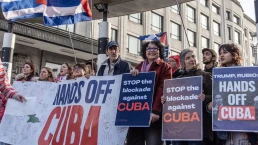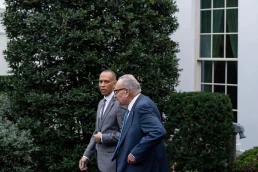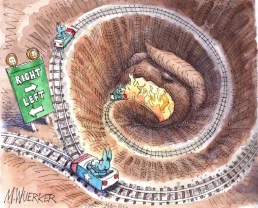Can we expand the state’s role in the economy while diminishing its capacity for war?
By J.W. Mason, Dissent
In the first two years after Biden’s election, there was considerable enthusiasm on the left for the administration’s embrace of a larger, more active economic role for the federal government. I was among those who saw both the ambitions of the Build Back Better bill and the self-conscious embrace of industrial policy as an unexpectedly sharp break with the economic policy consensus of the past thirty years.
Biden squandered that early promise with his embrace of Israel’s campaign of mass murder in Gaza. His legacy will be the piles of shattered buildings and children’s corpses that he, with aides like Antony Blinken, did so much to create.

The administration has also struck a Trumpian note on immigration, promising to “shut down the border” to desperate asylum seekers. And internationally, it is committed to a Manichean view of the world where the United States is locked into a perpetual struggle for dominance with rivals like Russia and China.
Can industrial policy be salvaged from this wreckage? I am not sure.
There are really two questions here. First, is there an inherent connection between industrial policy and economic nationalism, because support for one country’s industries must come at the cost of its trade partners? And second, is it possible in practice to pursue industrial policy without militarism? Or does it require the support of the national security establishment, the only powerful constituency that favors a bigger and more active government?
Much of the conversation around industrial policy assumes that one country’s gain must be another’s loss. U.S. officials insist on the need to outcompete China in key markets and constantly complain about how “unfair” Chinese support for its manufacturers disadvantages U.S. producers. European officials make similar complaints about the United States.
This zero-sum view of trade policy is shared by an influential strand of thought on the left, most associated with Robert Brenner and his followers. In their view, the world economy faces a permanent condition of overcapacity, in which industrial investment in one country simply depresses production and profits elsewhere. In the uncompromising words of Dylan Riley, “the present period does not hold out even the hope of growth,” allowing only for “a politics of zero-sum redistribution.” Development, in this context, simply means the displacement of manufacturing in the rich countries by lower-cost competitors.
Recent Posts
Despite Marco Rubio’s Warnings, This is the Time to Go to Cuba in Solidarity Against the Latest U.S. Aggressions
February 10, 2026
Take Action Now When visiting Cuba, one can see quickly the terrible effects of the almost seven decades of the U.S. economic blockade of Cuba.By…
“Hands Off Cuba!”: Left Groups in Europe Mobilize Against U.S. Aggression
February 10, 2026
Take Action Now Hundreds demonstrated in Belgium in solidarity with Cuba as further mobilizations against US imperialism are planned across Europe.……
Democrats Propose Minor Reforms for ICE — and Record Funding
February 10, 2026
Take Action Now Congressional Democratic leaders are asking ICE to agree to reforms, promising to vote for $11 billion in funding for the agency if…
Why We Need to Complain About Democrats
February 9, 2026
Take Action Now Too often, centrist Democrats work against progressives, as with NAFTA and the Crime Bill that accelerated mass incarceration.WORT…




